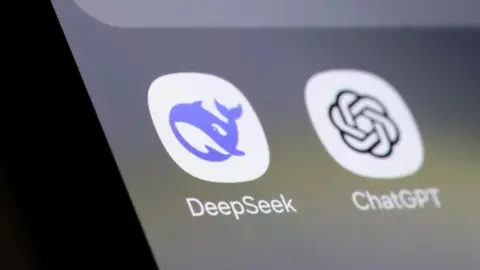The emergence of China’s DeepSeek AI application has sent ripples through the technology sector, significantly shaking the American confidence that has long been a hallmark of its dominance in artificial intelligence (AI). The event is described as almost staggering in its impact, unsettling markets and causing serious introspection within Silicon Valley. Marc Andreessen, a prominent venture capitalist, likened it to a “Sputnik moment,” referring to the satellite that ignited the global space race, highlighting the potential stakes involved in this latest technological evolution.
DeepSeek rapidly rose to prominence, achieving the status of the most downloaded free app on Apple’s U.S. App Store over a recent weekend. The fallout was intense, with major technology stocks witnessing significant declines as concerns grew regarding America’s AI leadership. Notably, shares of Nvidia—an AI chip designer celebrated in recent years—plummeted by 17% and wiped nearly $600 billion from its market value, marking it as possibly the most significant loss in U.S. stock market history.
The shockwaves stemming from DeepSeek’s introduction largely stem from a stark contrast in operational costs compared to its U.S. rivals. While OpenAI, the company behind ChatGPT, faced staggering expenditures of $5 billion in the previous year, DeepSeek’s developers claimed they were able to create their AI model for a mere $5.6 million. This disparity in operational costs prompted serious questions across Silicon Valley about the sustainability and future prospects for established players in the AI arena.
As the ripple effect of DeepSeek’s success unfolded, an unexpected silence fell over many industry figures who typically engage eagerly with journalists. Investors, analysts, and other observers expressed their astonishment at DeepSeek’s rapid ascent. While many pondered whether this moment represented a good buying opportunity, others remained skeptical about the financial figures that DeepSeek had disclosed. Longtime analyst Gene Munster raised questions about DeepSeek’s financial credibility and potential subsidies, noting, “I still think the truth is below the surface.”
The swift emergence of DeepSeek has evoked a feeling or sentiment that might be described as a “flex” by China—a move that serves as a wake-up call for the American tech industry. Just days before DeepSeek’s ascendance, major American technology figures like OpenAI’s Sam Altman and Oracle’s Larry Ellison stood alongside former President Donald Trump at a press briefing, akin to a celebratory affair underscoring American preeminence in AI. During that event, the group announced infrastructure investments, including a joint venture titled “Stargate,” which promised up to $500 billion in private investment to bolster AI infrastructure.
The operating premise underlying U.S. competitive advantage in AI centered around its wealth of data centers and access to advanced microchips, while also recognizing China’s strengths in rare-earth elements and engineering prowess. However, with DeepSeek’s launch, a new narrative may be emerging that challenges the prevailing wisdom of American superiority in AI technology.
In light of the unexpected arrival of DeepSeek, speculation arose concerning the potential need for recalibrating the American approach to AI, moving towards a paradigm that embraces cost efficiency. Trump’s remarks about the urgent need for the American tech sector to innovate at lower costs ring true as the market adjusts to this changing landscape. DeepSeek’s breakthrough has provoked audiences to reconsider long-held ideas about the requisite capital, computing power, and resources necessary for successful AI systems.
For the foreseeable future, the fate of semiconductor giants like Nvidia hangs in the balance, poised at the intersection between complacency and necessity for innovation. DeepSeek itself has attributed its success to a combination of existing technology and open-source software, fostering a narrative that technology can be both accessible and affordable. Meanwhile, background information discloses that the company’s founder, Liang Wenfung, had been strategically stockpiling AI-essential GPUs, hinting that the necessary technology may have been secured ahead of this launch.
As industry giants watch the developments closely, Altman’s subdued acknowledgment that DeepSeek is “impressive… particularly around what they’re able to deliver for the price” encapsulates a fresh dynamic in the AI race. This surprising emergence of a competitor underscores that the challenges from China in this technology sector may be far more significant than once assumed and could dramatically influence future competition in AI development and deployment.



